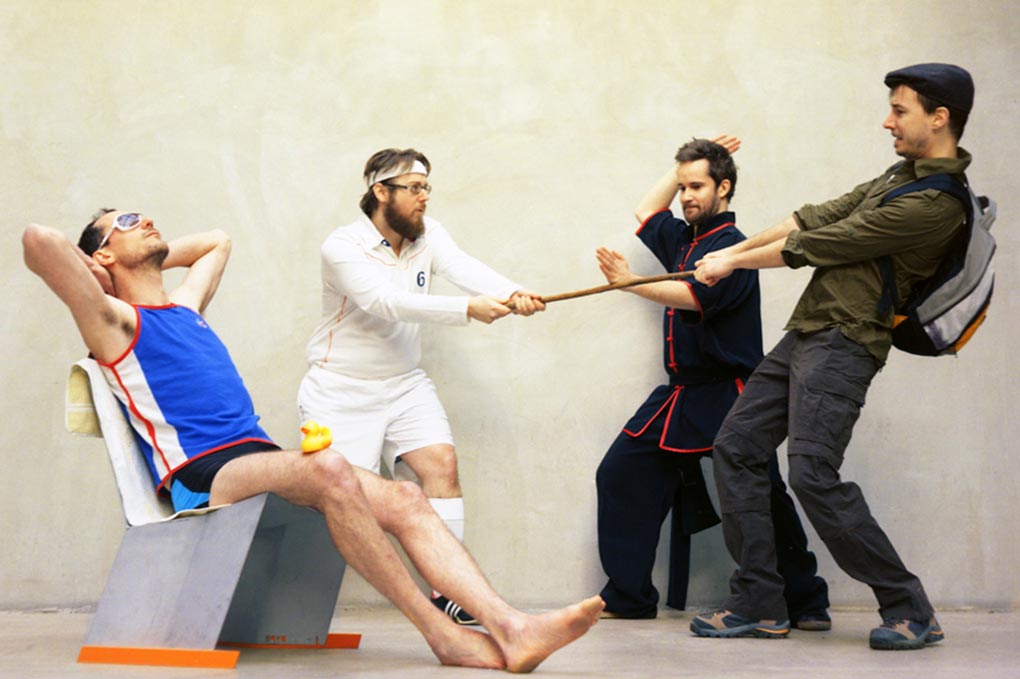ARTISTS
Emile Parisien

The first album of the quartet showed a clear desire to explore new musical territories, in which the vivid sparks provoked by the collage aesthetic made the collective composed thematic matter implode, taking it out, as if with forceps, of the eternal structure of “theme/chorus/theme”, and replacing it with a whirling vortex of musical sensations. The question then became, what to do with the severed limbs of that first cadaver, still warm? The answer, as it revealed in the group’s second album is clear: forget the various influences, solidify the matter, harden it and melt the resulting flurry of music into a new narration. This can be clearly heard in Sanchator de profundis, whose uniquely formed parts entwine to become a true “space opera”. For in the crevices of this piece’s theme, and its slow exposition, textures truly vibrate, whose intensity only grows as they traverse this sparse unexplored landscape. The drums, along the prepared piano, seep and meld along the sustained tensions created by the bass’ bow, discovering new galaxies. At the helm of the melodic wheel, winding through this unchartered pace, stands the soprano saxophone, avoiding comets and enemies’ fire, guiding them to a smooth landing on a provocatively strange and peaceful planet.
Just as in Schonberg’s Opus 34, the cinematic “scenes” offered by the quartet are merely soundtracks, threading their own network of images and emotions, that lead the listener to new and yet even more intricate sensations: melancholy, mysticism and energy, as in the Requiem Titanium piece, where a dramatic progression links the ostinato, the requiem and “the peaches” in a crescendo finishing on a furious explosion. The suture point between the composing, which imposes elements of colour and aesthetic, and the liberating fire of improvisation, either creates ruptures, or becomes invisible as in Le Bel à l’agonie, prelude of the third act of Wagner’s Tristan and Isolde, the only non-original piece. The result is a fantasia of timbres, one that is in turn glistening, dissonant and frightening; wandering around the created sparks, foreshadowing Wagner’s eruption of tragic themes, giving them an unprecedented magic. The relatively dark and anguish tonality of the compositions does not prevent the quartet from having a full reservoir of humour, and firing it out at will. This is highlighted in Darwin a la montagne, which, in a span of less than five minutes, juxtaposes a deconstructed improvisation, with furious free jazz and nearly old-school swing. The quartet’s collage aesthetic can sometimes have the insolence of pop-art as in Sopalynx, which looks like a series of abstract motifs. Firstly revelling in a playful and wild-haired game of musical call and answer, that manages to keep an impeccable equilibrium before giving way to expressionist metastases that begins to chew on the treacherous peacefulness of the oblige, to finally shift the piece toward a hallucinated trance. The title of the album works as the group’s manifesto; quick and innovative; intense and lyrical; knowing how to manipulate absurd parodies in order to diffuse the over-the-top effects, all of which results in the quartet possessing a pungent musical identity, that remains open to never ending evolution, lavishly unlocking new frontiers.
The Emile Parisien Quartet is one of the most exciting band on the modern scene.
Since 2004, these young musicians have amazed their audience with spirit and maturity. Their performances, in great festivals such as Marciac, Toulouse, Bayonne, Limoges, Châteauvallon, and in many clubs in Paris: Duc des Lombards, Sunset, La Fontaine, Les Disquaires, have been applauded by both audience and critics, delighted by the commitment and energy showed on stage.
"Originality is neither artificial nor demonstrative here, but emerges from the intense exploration of familiar musical trends; that of Coltrane and Wayne Shorter of course, but also Berlioz, Stravinsky and Schoenberg. If their reading of this musical heritage is so fascinating, it has to do with the implication and the artistic rigour which nourishes the four musicians. Every note, every bar is played with the expressiveness of those urged to transmit their passion. These four musicians are one single voice, and though they all possess great individual skills, the audience is never disturbed from the emotional course of their collective compositions.”
Damien Bertrand.
www.emileparisienquartet.com
*
MANAGEMENT / BOOKING

Inclinaisons
109, rue Gambetta - 33200 Bordeaux - France
Phone : +33 (0)5 35 38 27 86
Marion Piras : This email address is being protected from spambots. You need JavaScript enabled to view it.
www.inclinaisons.com


